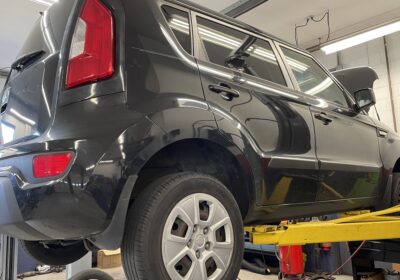Winterizing your car is essential to ensure that it can handle the challenges posed by cold weather. Here are reasons why you should winterize your car:
Engine Protection:
- Cold temperatures can affect your engine’s performance. Winterizing involves checking and changing the oil to a winter-grade oil that flows better in cold weather, providing better engine protection.
Battery Maintenance:
- Cold weather can be tough on car batteries, reducing their efficiency. Winterizing includes checking the battery, cleaning terminals, and ensuring it’s in good condition to prevent starting issues during cold spells.
Antifreeze/Coolant Check:
- Antifreeze, or coolant, prevents the engine and radiator from freezing in cold temperatures. Winterizing involves checking the antifreeze levels and ensuring it is at the right concentration to protect against freezing.
Tire Inspection:
- Cold weather can affect tire pressure. Winterizing includes checking tire pressure, rotating tires if necessary, and considering winter tires for improved traction on snow and ice.
Brake System Check:
- Cold weather can affect brake performance. Winterizing involves checking the brake system, including brake fluid levels and the condition of brake pads, to ensure optimal braking in winter conditions.
Heater and Defroster Inspection:
- Cold weather demands a functional heater and defroster for comfort and visibility. Winterizing includes checking these systems to ensure they are working properly.
Windshield Wiper Maintenance:
- Cold weather can lead to frozen wiper blades and reduced visibility. Winterizing includes installing winter-grade wiper blades and topping up windshield washer fluid with a winter formula.
Exhaust System Inspection:
- Cold weather can accelerate wear on the exhaust system. Winterizing involves checking for leaks, as a leaking exhaust can be especially dangerous during winter when windows are often closed.
Emergency Kit Preparation:
- Winterizing also includes preparing an emergency kit with items like a blanket, flashlight, extra clothing, and non-perishable snacks in case you get stranded in cold conditions.
Fluid Level Check:
- Winterizing involves checking and topping up other essential fluids, such as transmission fluid, power steering fluid, and brake fluid.
Lock and Door Seal Lubrication:
- Lubricating locks and door seals can prevent freezing and ensure that doors and locks operate smoothly in cold weather.
By winterizing your car, you are taking proactive steps to address specific challenges posed by winter conditions. It helps ensure your safety, maintain your vehicle’s performance, and reduces the risk of breakdowns during cold weather.
#ryansservicenter, #carrepair, #autorepair





